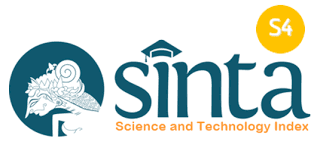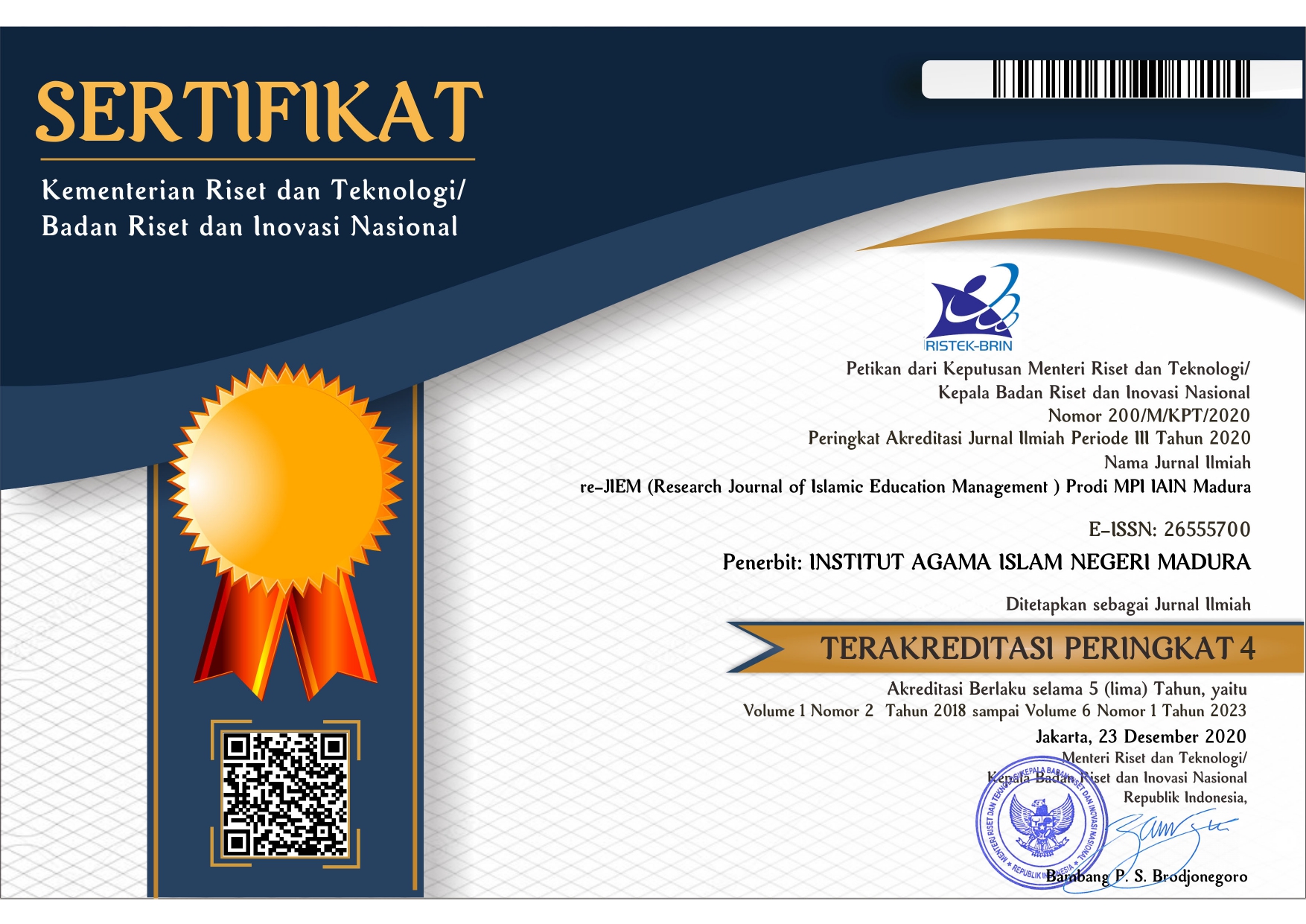KEPEMIMPINAN SPIRITUAL KIAI DALAM MENINGKATKAN KOMPETENSI MEMBACA DAN MEMAHAMI KITAB KUNING DI PONDOK PESANTREN MAMBAUL ULUM PONDOK WULUH LECES PROBOLINGGO
 Abstract views: 460
,
Abstract views: 460
,
 PDF downloads: 443
PDF downloads: 443
Abstract
This study aims to reveal the form of the kiai's spiritual leadership values, as well as their relation to the competence to read and understand the yellow book of santri at the Mambaul Ulum Islamic boarding school, Pondok Wuluh Leces Probolinggo. This study uses a qualitative approach. Data was collected through in-depth interviews, observation, and documentation. Data analysis by reducing data, presenting data, and verifying data. Checking the validity of the data using source triangulation techniques and triangulation techniques. Informants in this study were kiai, boarding school administrators, students, and guardians of students. The results showed that: 1) The form of the kiai's spiritual leadership values included true honesty, justice, good deeds, discipline but still flexibility, and humility; 2) The relationship of the kiai's spiritual leadership with the competence to read and understand the yellow book of santri, namely the kiai as a leader at the Islamic boarding school has full responsibility in all pesantren programs, the kiai as a motivator who inspires students so that students have a disciplined character, are able to awaken the best in themselves, focus on the goal or have a strong desire, seek blessings, and riyaḍah.
Downloads
References
Amirudin, Ja’far, and Elis Rohimah. “Implementasi Kurikulum Pesantren Salafi Dan Pesantren Modern Dalam Meningkatkan Kemampuan Santri Membaca Dan Memahami Kitab Kuning.” Jurnal Pendidikan Universitas Garut 14, no. 01 (2020): 268–82. https://journal.uniga.ac.id/index.php/JP/article/view/908/863.
Arikunto, Suharsimi. Prosedur Penelitian Suatu Pendekatan Praktek. Jakarta: PT. Rineka Cipta, 2010.
Aziz, Helmi, and Nadri Taja. “Kepemimpinan Kyai Dalam Menjaga Tradisi Pesantren (Studi Deskriptif Di Pondok Pesantren Khalafi Al-Mu’awanah Kabupaten Bandung Barat).” Ta’dim Jurnal Pendidikan Islam V, no. 1 (2016): 9–18. https://ejournal.unisba.ac.id/index.php/tadib/article/view/2123.
Behri, Mat. “Penerapan Program Akselerasi Baca Kitab Kuning Di Majelis Musyawarah Kutubuddiniyah (M2KD) PP. Mambaul Ulum Bata-Bata Ds. Panaan Kec. Palengaan Kab. Pamekasan.” Fikrotuna 6, no. 2 (2017): 678–94. https://doi.org/10.32806/jf.v6i2.3114.
Dalimunthe, Rasyid Anwar. Setrategi Pembelajaran Kitab Kuning Di Pondok Pesantren. Edited by Sahkholid Nasution. Medan: Perdana Publishing Medan, 2020.
Hadi, Syamsul. “Kepemimpinan Spiritual Solusi Mengatasi Krisis Kepemimpinan Pendidikan Islam.” Lisan Al-Hal 4, no. 1 (2012): 25–50. https://journal.ibrahimy.ac.id/index.php/lisanalhal/article/view/41.
Hendricks, Gay, and Kate Ludeman. The Corporate Mystic: A Guidebook for Visionaries with Their Feet on the Ground. New York, USA: Bantam Books, 1996.
Kennenth Blanchard, and Spencer Johnson. The One Minute Manager : Manajer Satu Menit. Jakarta: Elek Media Komputindo, 2001.
Kesuma, Guntur Cahaya. “Pesantren Dan Kepemimpinan Kyai.” Terampil : Jurnal Pendidikan Dan Pembelajaran Dasar 1, no. 1 (2017): 99–117. http://ejournal.radenintan.ac.id/index.php/terampil/article/view/1308.
Mastuhu. Dinamika Pendidikan Pesantren; Suatu Kajian Tentang Unsur Nilai Sistem Pendidikan Pesantren. Jakarta: INIS, 1994.
Mu’izzuddin, Mochammad, Juhji Juhji, and Hasbullah Hasbullah. “Implementasi Metode Sorogan Dan Bandungan Dalam Meningkatkan Kemampuan Membaca Kitab Kuning.” Geneologi PAI: Jurnal Pendidikan Agama Islam 6, no. 1 (2019): 43. https://doi.org/10.32678/geneologipai.v6i1.1942.
Muh. Hambali, and Mu’alimin. Manajemen Pendidikan Islam Kontemporer Strategi Pengelolaan Dan Pemasaran Pendidikan Islam. Yogyakarta: IRCiSoD, 2020.
Mukaromah, Siti Maulidatul. “Kepemimpinan Spiritual (Spiritual Leadership) Guru Sekolah Dasar Dalam Pembentukan Karakter Peserta Didik.” Elementary: Jurnal Ilmiah Pendidikan Dasar 4, no. 1 (2018): 63. https://doi.org/10.32332/elementary.v4i1.1029.
Priansa, Donni Juni, and Sonny Suntani Sentiana. Manajemen Dan Supervisi Pendidikan. Bandung: CV. Pustaka Setia, 2018.
Rafsanjan, Haqiqi. “Kepemimpinan Spiritual (Spiritual Leadership).” Jurnal Masharif Al-Syariah: Jurnal Ekonomi Dan Perbakan Syariah 2, no. 1 (2017).
Rofiatun, Rofiatun, and Mohammad Thoha. “Manajemen Pembinaan Kedisiplinan Santri Dalam Mengikuti Kegiatan Keagamaan Di Pondok Pesantren Nurus Shibyan Ambat Tlanakan Pamekasan.” Re-JIEM (Research Journal of Islamic Education Management) 2, no. 2 (2019): 278. https://doi.org/10.19105/re-jiem.v2i2.2937.
Rouf, Abdur. “Transformasi Dan Inovasi Manajemen Pendidikan Islam.” Manageria: Jurnal Manajemen Pendidikan Islam 3, no. 2 (2017): 138–62. https://doi.org/10.24090/jk.v3i2.904.
Sa’adah, Halimatus, and Ali Nurhadi. “PROBLEM KEDISIPLINAN MAHASISWA PROGRAM STUDI MANAJEMEN PENDIDIKAN ISLAM DALAM KULIAH DARING MENGHADAPI PANDEMIK CORONA VIRUS DESEASE-2019 DI FAKULTAS TARBIYAH INSTITUT AGAMA ISLAM NEGERI MADURA.” Re-JIEM (Research Journal of Islamic Education Management) 3, no. 2 (2020): 129–42. https://doi.org/10.19105/re-jiem.v3i2.4083.
Sahlan. “Pengaruh Kepemimpinan Transformasional Dalam Meningkatkan Kreatifitas Santri.” Jurnal At-Tarbiyat : Jurnal Pendidikan Islam 3, no. 1 (2020): 30–40. https://doi.org/10.37758/jat.v3i1.204.
Sugiono. Metode Penelitian Manajemen. Bandung: Alfabeta, 2016.
Tobroni. The Spiritual Leadership. Malang: UMM Press, 2010.
Yuliana, Kharisma Novi. “Implementasi Kepemimpinan Kyai Dalam Meningkatkan Prestasi Santri Di Pondok Pesantren Al-Multazam Mojoanyar Mojokerto.” UIN Maulana Malik Ibrahim Malang, 2020. http://etheses.uin-malang.ac.id/24647/1/16170054.pdf.
Copyright (c) 2022 Muhammad Amin

This work is licensed under a Creative Commons Attribution-ShareAlike 4.0 International License.
Authors who publish with this journal agree to the following terms:
Authors retain copyright and grant the journal right of first publication with the work simultaneously licensed under a Creative Commons Attribution-ShareAlike 4.0 International License that allows others to copy and redistribute the material in any medium or format with an acknowledgment of the work's authorship and initial publication in this journal and also allows to remix, transform, and build upon the material for any purpose, even commercially with contributions under the same license as the original.
Authors are able to enter into separate, additional contractual arrangements for the non-exclusive distribution of the journal's published version of the work (e.g., post it to an institutional repository or publish it in a book), with an acknowledgment of its initial publication in this journal.
Authors are permitted and encouraged to post their work online (e.g., in institutional repositories or on their website) prior to and during the submission process, as it can lead to productive exchanges, as well as earlier and greater citation of published work.



























